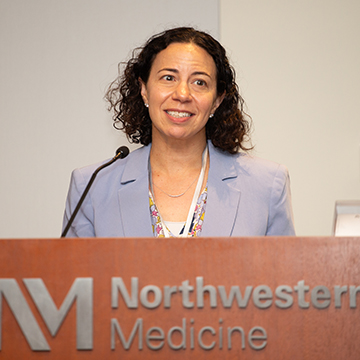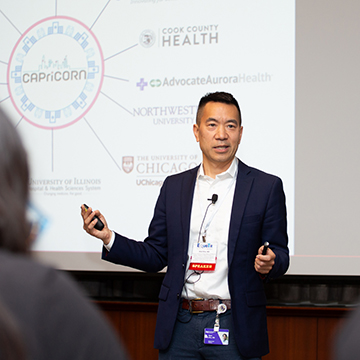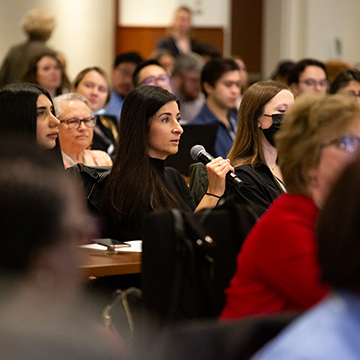EQuaTR Conference Explores Clinical Research in Age of AI
The Enhancing Quality in the Translational Research Workforce Conference (EQuaTR) — held April 10 on the Northwestern Medicine campus — created the type of interactive platform that is a hallmark of collaborative events co-hosted by the Northwestern University Clinical and Translational Sciences (NUCATS) Institute, the Institute for Translational Medicine (ITM), and the University of Illinois at Chicago Center for Clinical and Translational Science (CCTS).
Open to professionals in clinical and translational research, the conference is led by Northwestern University Feinberg School of Medicine’s Sharon Rosenberg, MD, in collaboration with an advisory board tasked with developing an annual conference agenda that aims to engage the larger medical community while simultaneously providing breakout sessions to connect in smaller settings.

EQuaTR allows the Chicagoland CTSA hubs and research community to come together to join in learning and networking. The speakers and breadth of knowledge shared was outstanding.”
Sharon Rosenberg, MD, EQuaTR Faculty Director
“EQuaTR allows the Chicagoland Clinical and Translational Science Award hubs and research community to come together to join in learning and networking. The speakers and breadth of knowledge shared was outstanding and I especially enjoyed seeing attendees make new connections within the Chicagoland research community,” said Rosenberg, a professor of Pulmonary and Critical Care in the Department of Medicine who has been a part of the NUCATS Institute for nearly a decade.
This year’s conference highlighted clinical research in the digital age, exploring how technological advances such as AI will change the research and data process for clinical research staff.
After Rosenberg provided opening remarks, Ken Getz, executive director and professor of the Tufts Center for the Study of Drug Development, discussed the current overview of the clinical research landscape. His presentation entailed how digital technologies and analytics are driving patient optimization and the debate on whether guardrails should be implemented in generative AI use cases. Following Getz, Abel Kho, MD, founding Director of the Institute for Artificial Intelligence in Medicine, deliberated the impact and prevalence of AI in research.
It was interesting to hear how AI is being used in medicine specifically and to get more background information about how AI systems are built and maintained.”

Taylor Knowles, a research study coordinator in Feinberg’s Division of Allergy and Immunology, is appreciative of EQuaTR’s commitment to connecting clinical professionals with field leaders. She enjoyed Kho’s keynote presentation as it seemed highly relevant to the current research landscape.
“It was interesting to hear how AI is being used in medicine specifically and to get more background information about how AI systems are built and maintained,” Knowles said.
Following the plenaries, conference attendees were assigned to two breakout sessions. Claire Donahue, MPH, clinical operations manager at the Robert H. Lurie Comprehensive Cancer Center, and Aditya Sanzgiri, director of research compliance at the University of Chicago, analyzed informed consent in the digital era and the benefits of utilizing econsent when recruiting participants; Norrina Allen, PhD, MPH, FAHA, offered insights on harnessing the power of remote data collection. In addition, a panel discussion was held regarding how to successfully prepare for an FDA inspection.

I resolved to the comfort of knowing that the issues and contemporary interests being communicated from the local, coordinator level are being effectively considered by the leadership and committee members who curated this event.”
Quadis Evans, senior clinical research coordinator at the University of Chicago’s Department of Ophthalmology and Visual Sciences, felt EQuaTR was an “eye-opening” experience that fostered an overwhelming sense of community among clinical and translational research professionals. He valued the discussions had with vendor representatives and is excited to apply what he’s learned from the conference to the growth of the clinical trial portfolio.
“I resolved to the comfort of knowing that the issues and contemporary interests being communicated from the local, coordinator level are being effectively considered by the leadership and committee members who curated this event program. I felt very seen. Every shared experience felt relatable and relevant to my own journey as a researcher,” Evans said.
EQuaTR concluded with an open floor networking opportunity.
EQuaTR is supported by the National Center for Advancing Translational Sciences (NCATS) of the National Institutes of Health (NIH) through Grant Number UL1TR001422 that supports NUCATS; Grant Number UL1TR002389 that supports ITM, and Grant Number UL1TR002003 that supports CCTS. The content is solely the responsibility of the authors and does not necessarily represent the official views of the NIH.
Written by Alex Miranda




